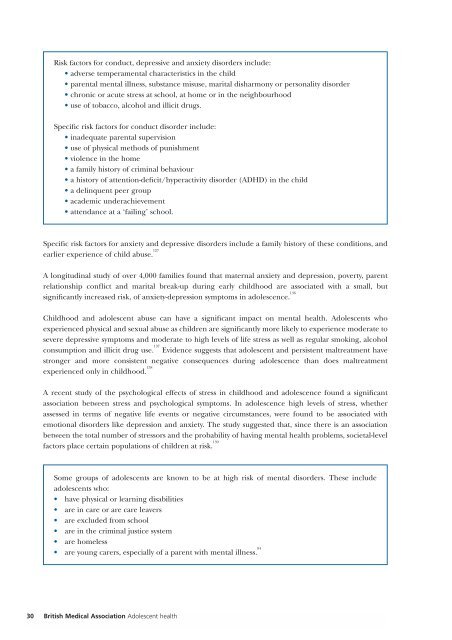Alcohol misuse: tackling the UK epidemic - London
Alcohol misuse: tackling the UK epidemic - London
Alcohol misuse: tackling the UK epidemic - London
Create successful ePaper yourself
Turn your PDF publications into a flip-book with our unique Google optimized e-Paper software.
30<br />
Risk factors for conduct, depressive and anxiety disorders include:<br />
• adverse temperamental characteristics in <strong>the</strong> child<br />
• parental mental illness, substance <strong>misuse</strong>, marital disharmony or personality disorder<br />
• chronic or acute stress at school, at home or in <strong>the</strong> neighbourhood<br />
• use of tobacco, alcohol and illicit drugs.<br />
Specific risk factors for conduct disorder include:<br />
• inadequate parental supervision<br />
• use of physical methods of punishment<br />
• violence in <strong>the</strong> home<br />
• a family history of criminal behaviour<br />
• a history of attention-deficit/hyperactivity disorder (ADHD) in <strong>the</strong> child<br />
• a delinquent peer group<br />
• academic underachievement<br />
• attendance at a ‘failing’ school.<br />
Specific risk factors for anxiety and depressive disorders include a family history of <strong>the</strong>se conditions, and<br />
earlier experience of child abuse. 127<br />
A longitudinal study of over 4,000 families found that maternal anxiety and depression, poverty, parent<br />
relationship conflict and marital break-up during early childhood are associated with a small, but<br />
significantly increased risk, of anxiety-depression symptoms in adolescence. 136<br />
Childhood and adolescent abuse can have a significant impact on mental health. Adolescents who<br />
experienced physical and sexual abuse as children are significantly more likely to experience moderate to<br />
severe depressive symptoms and moderate to high levels of life stress as well as regular smoking, alcohol<br />
consumption and illicit drug use. 137<br />
Evidence suggests that adolescent and persistent maltreatment have<br />
stronger and more consistent negative consequences during adolescence than does maltreatment<br />
experienced only in childhood. 138<br />
A recent study of <strong>the</strong> psychological effects of stress in childhood and adolescence found a significant<br />
association between stress and psychological symptoms. In adolescence high levels of stress, whe<strong>the</strong>r<br />
assessed in terms of negative life events or negative circumstances, were found to be associated with<br />
emotional disorders like depression and anxiety. The study suggested that, since <strong>the</strong>re is an association<br />
between <strong>the</strong> total number of stressors and <strong>the</strong> probability of having mental health problems, societal-level<br />
factors place certain populations of children at risk. 139<br />
Some groups of adolescents are known to be at high risk of mental disorders. These include<br />
adolescents who:<br />
• have physical or learning disabilities<br />
• are in care or are care leavers<br />
• are excluded from school<br />
• are in <strong>the</strong> criminal justice system<br />
• are homeless<br />
• are young carers, especially of a parent with mental illness. 94<br />
British Medical Association Adolescent health
















